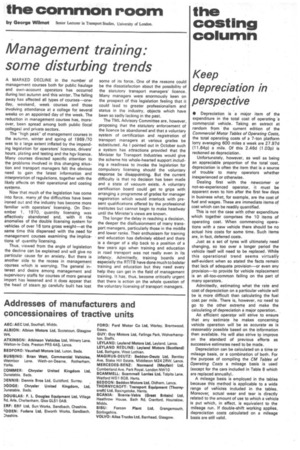Keep depreciation in perspective
Page 119

If you've noticed an error in this article please click here to report it so we can fix it.
• Depreciation is a major item of the expenditure in the total cost of operating a commercial vehicle. Taking an extract at random from the current edition of the Commercial Motor Tables of Operating Costs, the total operating costs of a 7-ton platform lorry averaging 600 miles a week are 27.97d (11.64p) a mile. Of this 2.46d (1.03p) is reckoned as depreciation.
Unfortunately, however, as well as being an appreciable proportion of the total cost, depreciation is often the item that is a source of trouble to many operators whether inexperienced or otherwise.
Dealing first with the newcomer or not-so-experienced operator, it must be apparent even to him after the first few days in business what, for example, are the cost of fuel and wages. These are immediate items of cost which can be readily quantified.
This is not the case with other expenditure which together comprises the 10 items of operating cost. When commencing operations with a new vehicle there should be no actual hire costs for some time. Such items are, in fact, deferred costs.
Just as a set of tyres will ultimately need changing, so too over a longer period the vehicle itself will need to be replaced. While this operational trend seems virtually self-evident when so stated the facts remain that lack of adequate provision—or even any provision—to provide for vehicle replacement is an all-too-common failing on the part of many operators.
Admittedly, estimating what the rate and cost of depreciation on a particular vehicle will be is more difficult than calculating the fuel cost per mile. There is, however, no need to go to the other extreme and make the calculating of depreciation a major operation.
An efficient operator will strive to ensure that any estimate he makes concerning vehicle operation will be as accurate as is reasonably possible based on the information then available. He will also strive tp improve on the standard of previous efforts as successive estimates need to be made.
Depreciation can be calculated on a time or mileage basis, or a combination of both. For the purpose of compiling the CM Tables of Operating Costs a mileage basis is used (except for the cars included in Table 8 which are replaced annually).
A mileage basis is employed in the tables because this method is applicable to a wide range of vehicles included in the tables. Moreover, actual wear and tear is directly related to the amount of use to which a vehicle is put which, in effect, is equivalent to the mileage run. If double-shift working applies, depreciation costs calculated on a mileage basis are still valid.






































































































































































